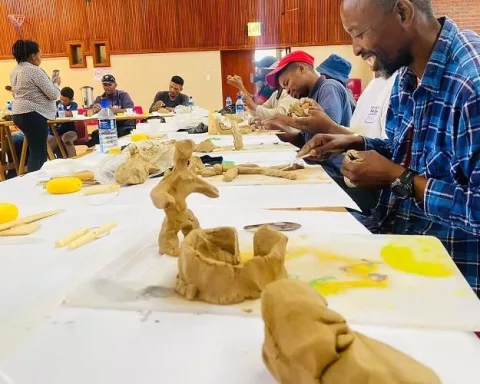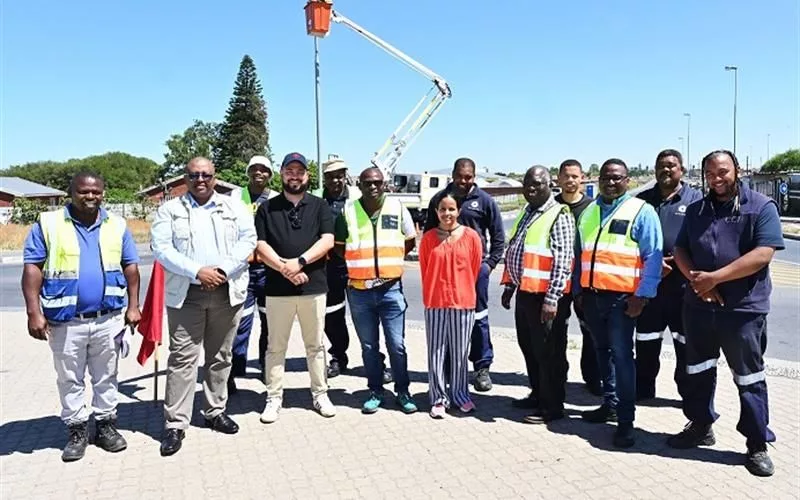In the small town of Wolmaransstad, Sergeant Pule Morake is a shining hero against gender-based violence. With fierce determination, he investigates crimes and helps victims find their voices. His biggest success came when he helped put a serial rapist behind bars for life, showing that justice can prevail. Morake inspires the community to stand together, reminding everyone that fighting against violence is a shared responsibility. His work fills the town with hope for a safer future where women and children can live without fear.
How is Sergeant Pule Morake fighting against gender-based violence in Wolmaransstad?
Sergeant Pule Morake tackles gender-based violence through dedicated investigations, securing life sentences for offenders, and encouraging victims to report crimes. His recent success against serial rapist Tshabile highlights his commitment to justice, community safety, and the broader movement for societal change against violence.
A Beacon of Hope in Wolmaransstad
In the quaint town of Wolmaransstad, located in South Africa’s North West province, a remarkable figure stands as a symbol of justice and resilience in the face of unyielding violence. Sergeant Pule Morake, a dedicated officer with the South African Police Service, has become a formidable force in the fight against gender-based violence. Through his unwavering dedication, he has not only provided solace to countless victims but has also delivered a powerful message to those who perpetrate fear and silence.
Sergeant Morake’s career with the Family Violence, Child Protection, and Sexual Offences (FCS) unit began in 2010. Over the years, he has emerged as a key player in combating sexual violence, successfully securing numerous life sentences for offenders. His most recent victory involves the conviction of Johannes Ontsheketse Tshabile, a serial rapist who had terrorized the community of Wolmaransstad.
Tshabile’s crimes were both calculated and horrifying. Disguised in a balaclava, he preyed on young women and girls, skulking around the outskirts of the town. Armed with a knife, he would drag his victims into secluded areas, subjecting them to brutal violence and robbery. His actions instilled fear throughout the community, leaving many women and children feeling vulnerable and unsafe.
Relentless Pursuit of Justice
Despite the immense challenges posed by Tshabile’s evasive tactics, Sergeant Morake remained resolute. He combined traditional detective methods with modern forensic science to meticulously gather evidence and build an airtight case. DNA evidence proved crucial in linking Tshabile to his heinous acts, ensuring that justice was served.
On February 21, 2024, the Klerksdorp Regional Court of the High Court of South Africa delivered a landmark verdict. Tshabile faced 65 charges, including rape, sexual assault, and aggravated robbery, and was sentenced to 11 life terms plus an additional 363 years in prison. This verdict not only reflected the severity of his crimes but also highlighted Sergeant Morake’s meticulous work and unwavering dedication.
Sergeant Morake’s professional success is a testament to his personal commitment to eradicating gender-based violence. He continually encourages victims to come forward and report crimes, emphasizing that their voices are crucial in creating a safer society. “I urge all victims of gender-based violence to speak up and not to be shy to report any incidents,” he stresses, fully aware that silence often protects the oppressor.
A Broader Movement for Change
The annual 16 Days of Activism for No Violence Against Women and Children serves as a poignant reminder of the tireless efforts of individuals like Sergeant Morake. This initiative, part of a global movement, advocates for the elimination of all forms of violence against women and children, urging society to reflect on past struggles and achievements in the pursuit of gender equality and human rights.
Sergeant Morake’s work connects with broader historical narratives of social justice. Much like the Suffragettes who fought for women’s voting rights in the early 20th century, today’s advocates challenge societal norms that perpetuate inequality. Morake’s dedication forms part of this ongoing struggle, echoing past efforts to dismantle oppressive systems.
His efforts also resonate with artistic expressions that challenge social injustices. Consider Frida Kahlo’s powerful art or Maya Angelou’s poignant writings, both of which address themes of resilience and hope. Sergeant Morake’s achievements mirror these voices, transforming pain into power and fear into courage.
Inspiring Collective Action
Beyond the courtroom, Sergeant Morake inspires a broader call to action. He reminds us that justice is not solely the responsibility of law enforcement; it is a duty that rests with society as a whole. Communities must remain vigilant and supportive, fostering environments where victims feel empowered to speak out and where perpetrators face inevitable justice.
The legal triumph against Tshabile offers closure, but it marks only one step in a wider journey. The battle against gender-based violence requires continuous, multifaceted efforts across various spheres. Education, public awareness, and community engagement are critical in shifting cultural narratives that allow such violence to persist.
In this context, Sergeant Morake’s work serves as a blueprint for effective policing and community collaboration. His achievements underscore the vital role of specialized investigation units like the FCS, which handle crimes with both sensitivity and expertise. These units are indispensable in a landscape where victims often face stigma and disbelief.
Legacy of Courage and Compassion
As society moves forward, figures like Sergeant Morake illuminate the path toward justice and equality. His dedication and integrity inspire meaningful change, leaving a legacy of courage and compassion. In the heart of Wolmaransstad, the corridors of the High Court resonate with the weight of its verdict—a testament to the power of justice to restore hope. Sergeant Pule Morake remains a steadfast guardian of that hope, embodying the relentless pursuit of a future where every woman and child can live free from fear.
FAQ: Sergeant Pule Morake’s Efforts Against Gender-Based Violence
How is Sergeant Pule Morake fighting against gender-based violence in Wolmaransstad?
Sergeant Pule Morake actively investigates cases of gender-based violence, securing life sentences for offenders and encouraging victims to report their crimes. His commitment to justice was exemplified by his successful prosecution of serial rapist Tshabile, which underscores his dedication to community safety and the ongoing fight against violence.
What significant case has Sergeant Morake worked on recently?
Sergeant Morake’s most notable recent success involved the conviction of Johannes Ontsheketse Tshabile, a serial rapist who was sentenced to 11 life terms and an additional 363 years in prison for multiple charges, including rape and aggravated robbery. This landmark verdict not only reflects the severity of Tshabile’s crimes but also highlights the extensive work put in by Sergeant Morake to secure justice.
What methods does Sergeant Morake use in his investigations?
Sergeant Morake employs a combination of traditional detective work and modern forensic science to gather evidence. His meticulous approach includes DNA analysis, which played a critical role in linking Tshabile to his crimes, demonstrating the importance of scientific methods in securing convictions.
How does Sergeant Morake inspire the community to combat gender-based violence?
Sergeant Morake serves as a beacon of hope and a source of inspiration in Wolmaransstad. He emphasizes that fighting against gender-based violence is a collective responsibility, urging community members to support victims and foster an environment where individuals feel safe to report crimes. His advocacy encourages a culture of accountability and vigilance among residents.
What role does the 16 Days of Activism play in this initiative?
The 16 Days of Activism for No Violence Against Women and Children is an annual global campaign that aligns with Sergeant Morake’s efforts. It highlights the ongoing struggle against gender-based violence and promotes awareness of women’s rights while encouraging society to reflect on the progress made and the challenges that remain in achieving gender equality.
What is the broader impact of Sergeant Morake’s work on society?
Sergeant Morake’s work extends beyond individual cases and serves as part of a larger movement for social justice. His dedication resonates with historical narratives of activism, mirroring the efforts of past advocates for equality. By securing justice for victims and encouraging community engagement, he helps to shift cultural attitudes and promote a safer environment for women and children in Wolmaransstad and beyond.












